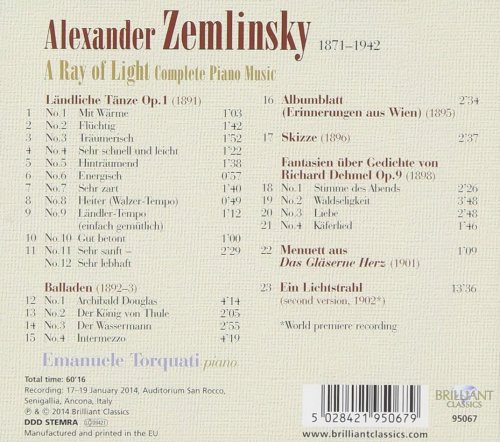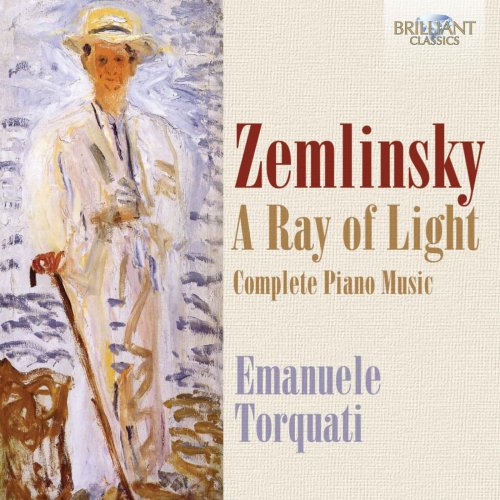
Emanuele Torquati - Zemlinsky: Complete Piano Music (2014)
BAND/ARTIST: Emanuele Torquati
- Title: Zemlinsky: Complete Piano Music
- Year Of Release: 2023
- Label: Brilliant Classics
- Genre: Classical Piano
- Quality: flac lossless (tracks)
- Total Time: 01:00:15
- Total Size: 212 mb
- WebSite: Album Preview
Tracklist
01. Ländliche Tänze, Op. 1: No. 1, mit Wärme
02. Ländliche Tänze, Op. 1: No. 2, Flüchtig
03. Ländliche Tänze, Op. 1: No. 3, Träumerisch
04. Ländliche Tänze, Op. 1: No. 4, Sehr schnell und leicht
05. Ländliche Tänze, Op. 1: No. 5, Hinträumend
06. Ländliche Tänze, Op. 1: No. 6, Energisch
07. Ländliche Tänze, Op. 1: No. 7, Sehr zart
08. Ländliche Tänze, Op. 1: No. 8, Heiter
09. Ländliche Tänze, Op. 1: No. 9, Ländler-Tempo
10. Ländliche Tänze, Op. 1: No. 10, Gut betont
11. Ländliche Tänze, Op. 1: No. 11, Sehr sanft, No. 12, Sehr lebhaft
12. Ballade No. 1: Archibald Douglas
13. Ballade No. 2: Der König von Thule
14. Ballade No. 3: Der Wassermann
15. Ballade No. 4: Intermezzo
16. Albumblatt (Erinnerungen aus Wien)
17. Skizze
18. Fantasien über Gedichte von Richard Dehmel, Op. 9: No. 1, Stimme des Abends
19. Fantasien über Gedichte von Richard Dehmel, Op. 9: No. 2, Waldseligkeit
20. Fantasien über Gedichte von Richard Dehmel, Op. 9: No. 3, Liebe
21. Fantasien über Gedichte von Richard Dehmel, Op. 9: No. 4, Käferlied
22. Menuett aus "Das gläserne Herz"
23. Ein Lichtstrahl

A friend of Brahms and teacher of Schoenberg, Alexander Zemlinsky was a composer who straddled the divide of the 20th century, signalling the end of the Romantic period and the beginning of a marked upswing in experimentation. For the most part, however, the piano music on this disc is still firmly in the tradition of the great Romantic composers, composed as it
was early on in his career. The Ländliche Tänze, or ‘Rustic Dances’, are a collection of light, pastoral dances, with nods to
Schumann and Brahms. More melancholy and mournful are the Balladen (‘Ballades’) and Erinnerungen aus Wien (‘Memory of
Vienna’), the latter referencing Wagner in its use of the ‘Tristan’ chord; these are works filled with the emotion and sensitivity one would expect from the tail end of this dramatic period, hinting at the developments that were to mark the following century. The lack of attention Zemlinsky’s oeuvre has received until now is sadly not surprising; a combination of the
composer’s own attitude to his works – he was more interested in writing than selfpromotion – his life coinciding with
dramatic historical events and his cultivation of a certain modesty of style (making him averse to dramatic emphasis and sensational effects in his music) meant that for a long time his output remained neglected. Emanuele Torquati is an acclaimed pianist, having performed at various prestigious concert venues across the globe. His recital at Columbia University in the USA garnered critical acclaim, with the New York Times praising him as a “thoughtful” and “insightful” musician, noting his sensitivity and skill at conveying to the listener how he thinks and feels about the music. This release complements his previous
recordings for Brilliant, which include Brahms and Schumann: his interpretation ofZemlinsky’s works rounds off this period of Romanticism perfectly.
Alexander Zemlinsky gains more and more attention as one of the key figures of that fascinating period of transition from Late Classical to Expressionism, from Mahler to Schoenberg. His works are highly individual and emotional, an expression of the Zeitgeist of an unsettled world of looming disasters. Zemlinsky’s output for piano solo is still firmly rooted in the Classicism of
Brahms, but with its own harmonic language, its chromatism hinting at further developments. Pianist Emanuele Torquati is
specialist in this repertoire, his recording of the complete piano music by Albert Roussel (BC 94329) won great critical acclaim in the international press.
01. Ländliche Tänze, Op. 1: No. 1, mit Wärme
02. Ländliche Tänze, Op. 1: No. 2, Flüchtig
03. Ländliche Tänze, Op. 1: No. 3, Träumerisch
04. Ländliche Tänze, Op. 1: No. 4, Sehr schnell und leicht
05. Ländliche Tänze, Op. 1: No. 5, Hinträumend
06. Ländliche Tänze, Op. 1: No. 6, Energisch
07. Ländliche Tänze, Op. 1: No. 7, Sehr zart
08. Ländliche Tänze, Op. 1: No. 8, Heiter
09. Ländliche Tänze, Op. 1: No. 9, Ländler-Tempo
10. Ländliche Tänze, Op. 1: No. 10, Gut betont
11. Ländliche Tänze, Op. 1: No. 11, Sehr sanft, No. 12, Sehr lebhaft
12. Ballade No. 1: Archibald Douglas
13. Ballade No. 2: Der König von Thule
14. Ballade No. 3: Der Wassermann
15. Ballade No. 4: Intermezzo
16. Albumblatt (Erinnerungen aus Wien)
17. Skizze
18. Fantasien über Gedichte von Richard Dehmel, Op. 9: No. 1, Stimme des Abends
19. Fantasien über Gedichte von Richard Dehmel, Op. 9: No. 2, Waldseligkeit
20. Fantasien über Gedichte von Richard Dehmel, Op. 9: No. 3, Liebe
21. Fantasien über Gedichte von Richard Dehmel, Op. 9: No. 4, Käferlied
22. Menuett aus "Das gläserne Herz"
23. Ein Lichtstrahl

A friend of Brahms and teacher of Schoenberg, Alexander Zemlinsky was a composer who straddled the divide of the 20th century, signalling the end of the Romantic period and the beginning of a marked upswing in experimentation. For the most part, however, the piano music on this disc is still firmly in the tradition of the great Romantic composers, composed as it
was early on in his career. The Ländliche Tänze, or ‘Rustic Dances’, are a collection of light, pastoral dances, with nods to
Schumann and Brahms. More melancholy and mournful are the Balladen (‘Ballades’) and Erinnerungen aus Wien (‘Memory of
Vienna’), the latter referencing Wagner in its use of the ‘Tristan’ chord; these are works filled with the emotion and sensitivity one would expect from the tail end of this dramatic period, hinting at the developments that were to mark the following century. The lack of attention Zemlinsky’s oeuvre has received until now is sadly not surprising; a combination of the
composer’s own attitude to his works – he was more interested in writing than selfpromotion – his life coinciding with
dramatic historical events and his cultivation of a certain modesty of style (making him averse to dramatic emphasis and sensational effects in his music) meant that for a long time his output remained neglected. Emanuele Torquati is an acclaimed pianist, having performed at various prestigious concert venues across the globe. His recital at Columbia University in the USA garnered critical acclaim, with the New York Times praising him as a “thoughtful” and “insightful” musician, noting his sensitivity and skill at conveying to the listener how he thinks and feels about the music. This release complements his previous
recordings for Brilliant, which include Brahms and Schumann: his interpretation ofZemlinsky’s works rounds off this period of Romanticism perfectly.
Alexander Zemlinsky gains more and more attention as one of the key figures of that fascinating period of transition from Late Classical to Expressionism, from Mahler to Schoenberg. His works are highly individual and emotional, an expression of the Zeitgeist of an unsettled world of looming disasters. Zemlinsky’s output for piano solo is still firmly rooted in the Classicism of
Brahms, but with its own harmonic language, its chromatism hinting at further developments. Pianist Emanuele Torquati is
specialist in this repertoire, his recording of the complete piano music by Albert Roussel (BC 94329) won great critical acclaim in the international press.
As a ISRA.CLOUD's PREMIUM member you will have the following benefits:
- Unlimited high speed downloads
- Download directly without waiting time
- Unlimited parallel downloads
- Support for download accelerators
- No advertising
- Resume broken downloads


